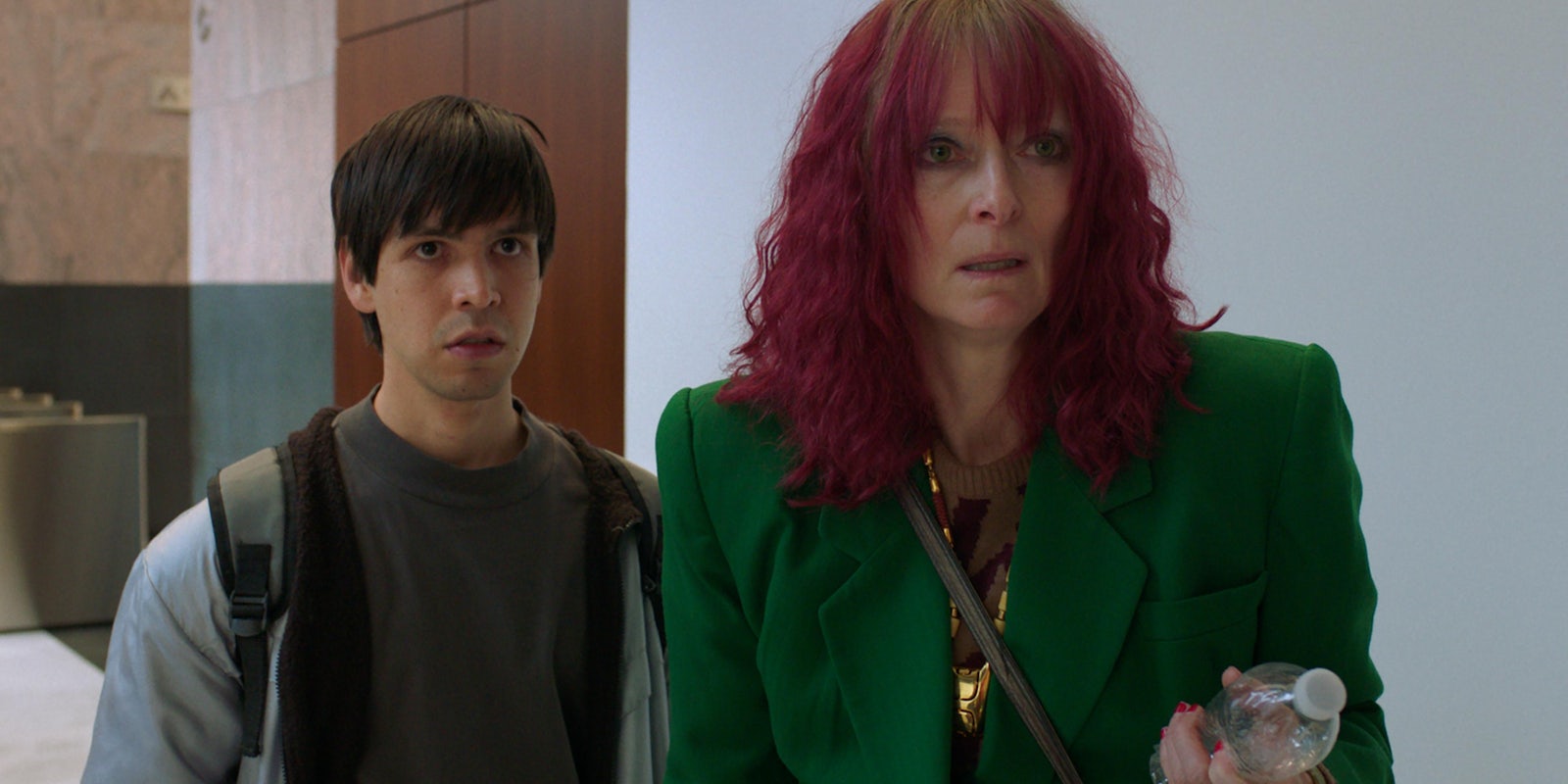An ode to those who refuse to take the easy way out, Julio Torres’ directorial debut Problemista oozes bold world-building and off-kilter laughs as a curious look at artistic dedication and the U.S. immigration system.
Torres stars as Alejandro, an awkward Ecuadorian immigrant in pursuit of the American dream: being a toymaker for the massive corporation Hasbro. With one tuft of hair always out of place (a la The Little Rascals’ Alfalfa), he drags his feet through a trash-ridden New York City with the demeanor of Nathan Fielder, though he doesn’t fully rely on the same discomfort of the lauded cringe comic.
Director: Julio Torres
Release: Theatrical
Julio Torres’ directorial debut juggles cartoonish visuals, immigration anxiety, and artistic dedication. And it co-stars Tilda Swinton as a brash hyper-Karen.
Co-star Tilda Swinton, on the other hand, emits pure demand and entitlement as a brash hyper-Karen art critic, Elizabeth Ascencio. Her terminally ill but cryogenically frozen husband, Bobby (RZA), is Alejandro’s client at FreezeCorp, a cryogenic facility that hasn’t yet figured out how to reawaken its customers. When Alejandro loses his job—and in turn, his visa sponsor—he latches onto the erratic Elizabeth, in hopes that putting up with her antics can earn her signature on his visa application.
While Alejandro’s main goal is to remain in the U.S. so he can apply for Hasbro’s “Talent Incubator Program,” Elizabeth sets her mind on fulfilling Bobby’s dream of a solo showcase for his 13 paintings, each one an egg depicting a different quality (“shy egg,” “intelligent egg”). Alejandro joins her quest, building a strange relationship with his menacing boss along the way.
Torres, a stand-up comedian and creator of Spanish-language HBO comedy Los Espookys, is known to lean into the alternative, and Problemista similarly holds no bounds. The film packs bold visualizations into its real-world narrative—expanding a common, albeit quirky, story into a colorful hero’s tale. As a result, Problemista feels like a storybook, and its narration by Isabella Rossellini (I mean, who else?) and haunting choir-driven score by Robert Ouyang Rusli only play into its cartoon-isms.
For example, Alejandro imagines Craigslist, the website via which he must pick up cash-paying odd jobs, as a personified, glitchy creature (an enigmatic Larry Owens) that dangles him over a dark abyss. Similarly, Elizabeth transforms into a red-eyed cave-dwelling monster, a hydra that Alejandro, dressed as a measly knight, must slay. With a set design that mirrors the same playfulness and dedication as that of a Disney theme park, Problemista leads a wonderful welcome into the wacky mind of our leading weirdo.
Problemista will be sure to draw comparisons to fellow A24 release Everything Everywhere All at Once by its visual quirks alone, but there’s no multiverse here, only the never-ending puzzle of the U.S. immigration system.
Torres’ vision is perhaps most pointed in its depiction of the hoops of immigration. The loss of a visa means the flipping of an hourglass, counting down the minutes until an immigrant (quite literally) disappears. Alejandro remains trapped in an unsolvable escape room that keeps him spinning in circles. As Rossellini narrates, “The maze is impossible to navigate unless, of course, he is willing to bend the rules.” These literal visualizations offer space to laugh at the absurdity of the system, but also comment on its legitimate issues.
Additionally, Alejandro’s relationship with his mother (Catalina Saavedra) who remains in Ecuador lies at the heart of his inspiration. Represented by the colorful 3D-rendered monuments he and his mother had dreamt up, this connection carries the film’s earnest baseline.
However, the Problemista’s final message lacks clarity; it lends too much empathy to Swinton’s Elizabeth, drawing a connection between her and Alejandro as “outsiders” who have very unique, but strong-willed dreams.
Elizabeth is best portrayed as the shadow-puppet hydra, and later, the cave-dwelling monster that Alejandro must face. Here, she becomes less of a character to be understood and more of a personification of the problems to overcome. Her most laughable aspects (her entitled white woman sensibilities, the iPhone flashlight that remains on during each scene, her obsession with the archival system FileMaker Pro, etc.) play into the de-characterization. As this monstrous image, Elizabeth equals a learning opportunity for Alejandro. “Become a problem for them,” she instructs him, and that he does.
While Alejandro puts her advice to use, the final act’s resolution whisks away his struggles with the power of pure manifestation.
“I live my life like a little rabbit,” Torres explained during the Q&A following the film’s SXSW world premiere. “Sometimes I have to remember, just in case, I have little claws.”
As inspiring as this is for the rabbits who forget about their own claws, the swiftness with which Alejandro overcomes his problems teeters on the all-too-familiar “pull yourself up by your bootstraps” message—even though this appears to be something Torres intended to critique.
Still, what makes Problemista worthwhile is Torres’ bold mind. A series of colorful objects rendered throughout the film’s locations are irresistible—even if the film’s themes aren’t quite polished into the narrative. To simply bear witness to his extended-length humor is an honor.



